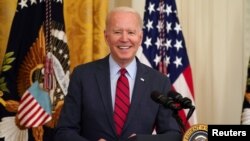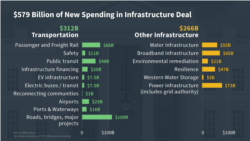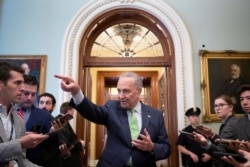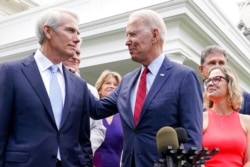A bipartisan agreement for infrastructure legislation demonstrates that American democracy can deliver, U.S. President Joe Biden declared on Thursday.
"This agreement signals to the world that we can function and deliver and do significant things," the president said during remarks in the White House East Room.
"We're in a race with China and the rest of the world for the 21st century," he said. "They're not waiting. They're investing tens of billions of dollars across the board."
The framework for the legislation was negotiated by a bipartisan group of senators and includes $579 billion in new infrastructure spending. It would also repurpose a similar amount of previously approved spending to bring the total investment in infrastructure to about $1.2 trillion.
"Neither side got everything they want in this deal," noted Biden. "That's what it means to compromise."
Cast to the side for now are other Biden priorities, such as money for child care and much of the president's agenda to mitigate and adapt to climate change.
"There was no agreement on the rest," Biden acknowledged. "We're going to have to do that through the budget process."
If united, Democrats, with Vice President Kamala Harris as the tie-breaking vote, can use the reconciliation legislative maneuver to approve the other desired spending with a simple majority.
"There won't be an infrastructure bill unless we have a reconciliation bill," House Speaker Nancy Pelosi declared earlier in the day.
Senate Majority Leader Chuck Schumer said he agreed with Pelosi on the approach.
The Republicans’ leader in the Senate, Mitch McConnell, accused the president of quickly caving in to threats from the Democratic leadership to hold the infrastructure deal hostage.
“Less than two hours after publicly commending our colleagues and endorsing the bipartisan agreement, the President took the extraordinary step of threatening to veto it,” said McConnell in a statement. “Now, I have no doubt that the President is under enormous pressure from some on the Left to deliver on a laundry list of radical climate demands.”
The infrastructure deal was first announced outside the White House West Wing, when Biden made a surprise appearance with a group of Republican and Democrat senators.
"Today, we are announcing the framework for an historic investment in infrastructure," said Senator Rob Portman, an Ohio Republican who sits on the Finance Committee. "This is roads and bridges but also lots of other kinds of infrastructure, including broadband, including our water system and our rail system, all of which is good for the economy."
The White House says the agreement specifically includes $312 billion for transportation projects, $55 billion for water infrastructure and $65 billion for expanding broadband internet service.
Senator Kyrsten Sinema, an Arizona Democrat, emphasized to reporters that "we all gave some to get some, because what we did was put first the needs of our country."
Discussions in recent days focused on a spending plan of more than $1 trillion, split roughly evenly between new and repurposed funding.
Specific targets of action included improving the nation's roads and electrical grid and widening access to broadband internet.
The discussions, involving 21 senators, were the latest in a series of efforts by Democrats and Republicans to work out an agreement on the size, priorities and funding sources for a major infrastructure program.
One of the main points of contention has been how to pay for the plan. Biden has advocated raising the corporate tax rate, but Republicans are opposed to that step, having successfully cut the rate during the previous administration of President Donald Trump.








